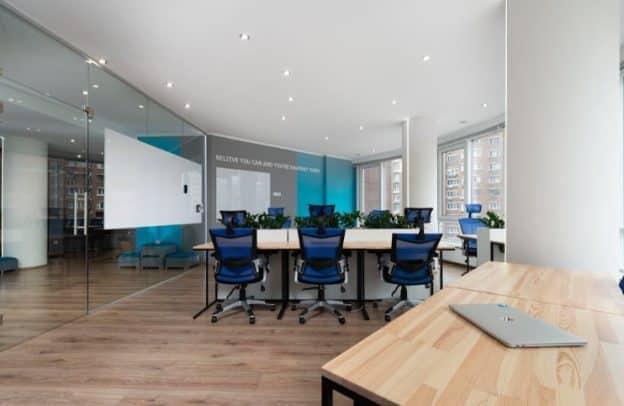When someone walks into your office, the space speaks before you do. A clean, well-kept workplace signals professionalism, care, and attention to detail. Cleanliness, however, is not only about impressing clients.
It directly influences how employees feel, work, and perform every day. A tidy environment reduces stress, supports health, and encourages productivity in ways that clutter never could. Consistent upkeep also protects your investment by extending the life of furniture, carpets, and equipment.
Clean offices do more than look good. They build trust, improve performance, and create lasting value that pays off over time.
The Power of First Impressions in Business
First impressions matter more than many realise, especially in business. The moment a client or visitor steps into an office, they begin making judgments not just about the space but about the company itself. A spotless, well-organised office sends a clear message: this business values professionalism, detail, and respect for the people it serves.
Different regions approach commercial cleaning in distinct ways. In the USA, large-scale cleaners often use standardised processes to ensure consistency. In Canada, providers frequently emphasise eco-friendly methods, reflecting growing demand for sustainable practices.
In Australia, as an example, the focus tends to be on flexibility, with services that adapt to both small businesses and large firms, offering tailored solutions for a variety of needs. There are several respectable service providers for office cleaning north sydney business owners prefer, so it is best to compare their packages before making a decision.
Cleanliness is more than appearance. It acts as a silent brand ambassador. A fresh, welcoming space inspires trust from the first handshake and sets the tone for stronger relationships.
Employee Morale and Productivity: A Cleaner Space, A Clearer Mind
When an office is clutter-free and well maintained, employees feel calm, focused, and valued. That sense of order makes a genuine difference to workplace culture.
Studies show that tidy, hygienic environments reduce distractions and stress. They provide the mental space employees need to concentrate and achieve more. Clean offices are also linked to higher job satisfaction, fewer sick days, and stronger morale.
There is real science behind this. Research indicates that offices with higher levels of cleanliness are associated with greater perceived productivity and overall satisfaction. When people work in a clean environment, they feel respected and motivated. These simple factors quietly fuel engagement and efficiency.
Maintaining a clean workplace is more than upkeep. It is an act of care that boosts clarity, mood, and performance in measurable ways.
Health and Safety Benefits of Regular Cleaning
A clean office is not only more pleasant to look at. It is also healthier and safer to work in. Regular cleaning reduces the spread of germs, dust, and allergens, which in turn lowers sick days and helps staff remain well. Wiping down high-touch areas such as keyboards, light switches, and door handles helps minimise the transmission of colds and flu. Routine dusting and vacuuming also improve air quality by reducing irritants that affect breathing.
Maintaining cleanliness is equally important for workplace safety. Dust and spills can create slippery floors or conceal hazards, but consistent upkeep allows these risks to be addressed before accidents occur. Regular cleaning also helps businesses stay compliant with health and safety standards, avoiding penalties and maintaining a responsible, professional environment.
Long-Term Savings Through Proper Maintenance
Investing in regular cleaning is one of the smartest ways to protect office assets and reduce long-term costs. For instance, routine carpet cleaning removes abrasive dirt that gradually wears down fibres, extending the life of the carpet. This means fewer replacements and greater savings over time.
The same principle applies to furniture, fixtures, and equipment. Consistent cleaning prevents damage and breakdowns, reducing repair or replacement costs. Dust build-up in electronics can block airflow, causing overheating and expensive malfunctions. With regular cleaning, these devices continue to run smoothly for longer.
In this way, cleaning is preventive care for the workplace. It extends the lifespan of assets and ensures better value from every investment.
The Business Case: Cleanliness as a Competitive Edge
Cleanliness is more than neatness. It is smart business strategy. Studies show that 94 per cent of customers are more likely to trust companies that maintain clean office environments. Trust builds loyalty, generates referrals, and directly influences repeat business. When clients walk into a tidy, well-kept space, they see professionalism, attention to detail, and reliability.
A clean workplace also strengthens brand reputation. It demonstrates care for quality at every level and encourages clients to spread positive word of mouth. In today’s competitive market, a clean environment is not only about appearances. It is a powerful differentiator that cultivates loyalty, builds reputation, and drives long-term success.
Clean Offices Drive Lasting Success
A clean office contributes to trust, health, and long-term value. From winning over clients to boosting employee morale and protecting assets, cleanliness is a strategic investment. Businesses that commit to maintaining high standards do more than look good today. They build a reputation that lasts into the future.

